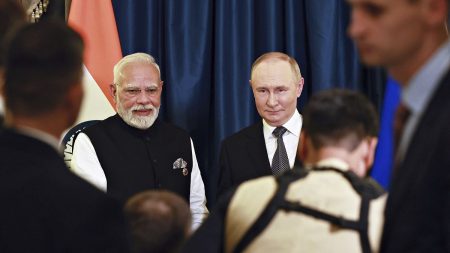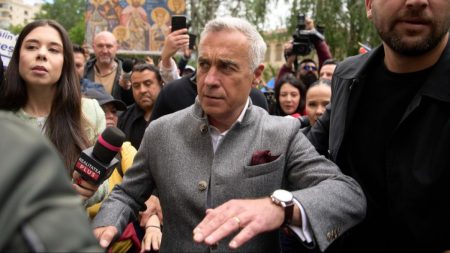Summarize this content to 2000 words in 6 paragraphs in Arabic
The perception that traditional parties are ineffective is increasingly leading the younger generation to put their trust in the reactionary messages of extremist parties.
ADVERTISEMENTThe European Parliament is leaning further to the right and, if the results are to be believed, so are the new generations of European voters. Both the far-right Identity and Democracy (ID) group and the European Conservatives and Reformists (ECR) are set to wield greater influence over the next five years in the European parliament after respectively adding nine and seven seats to their tallies following the European electionsheld earlier this month.Data from the think tank ThinkYouth suggest young people played in big role in that. The far-right Alternative for Germany (AfD) secured a big share of the young people’s vote, meanwhile about a third of young people voted for the far-right National Rally (RN) in France and the Confederation of Freedom and Independence party in Poland where the ultra-conservative Law and Justice party also secured 16% of this key demographic. Getting “rid of technocrats”, returning to a “Europe of nations”, clamping down on immigration and weakening “ineffective and corrupt” traditional parties are some of the arguments brought forward by young people who gave their vote to far-right or ultra-nationalist parties.A springboard to national politicsNow Enzo Alias, a young National Rally supporter, is hoping Marine Le Pen’s party will “make history” in the upcoming snap legislative elections in France, and “impose itself as the first political force in France”.French President Emmanuel Macron dissolved the national assembly and called these elections after his centrist Renaissance party took a drubbing in the European elections, coming a very distant second to RN which secured over 31% of the vote. For Alias, who’s also the president of the Patriots Network youth organisation whose members are tied to far-right or right-wing populist parties from around the world, the RN’s results in the European elections confirm that the party “has always been very popular among young people” and that it has been able to capture the segment that aspires to a “conservative, patriotic and security-oriented” France. He argues to Euronews that RN should work to “completely reform the European Union and put the technocrats out of work to return to a Europe of nations that respects the sovereignty of each nation”. “I am committed to the party’s ideas because I am a patriot who can no longer bear to see his country sinking without our government intervening or turning a blind eye to its fate,” he adds.Signe Vedersø Keldorff, president of the youth wing of the nationalist and right-wing populist Danish People’s Party, also believes the EU should “stay out of the daily lives of the Danes”.Her party, led by Morten Messerschmidt, became the second largest political force in Denmark in 2015, then lost popularity, but Vedersø is hopeful that the favourable results obtained by ID and ECR could help reverse this trend. “Many people see us as an extremist party,” she tells Euronews, “but I think we are misunderstood because we only want a safe policy for Denmark.”The corruption argumentSpanish newcomer The Party’s Over (‘Se acabó la fiesta’), a radical anti-system movement, has managed to secure two seats in the European Parliament with the fight against political corruption as its only real electoral proposal.Its leader, Alvise Pérez, presents himself as an agitator who promises to raffle off his entire MEP salary if he manages to shake up politicians who “live off the impunity of theft”. Through his Telegram channel, he has managed to connect with a young and Eurosceptic electorate.This is the case of I.R.L., a 29-year-old for whom Pérez “offers a fresh and direct alternative to the traditional parties, which have proven to be ineffective and corrupt”. Moreover, the voter also told Euronews, his presence on social networks has created a direct connection with this generation, which is tired of empty promises and wants to see concrete actions.This young man’s distrust of the EU is due to its “excessive bureaucracy” and its failure to “protect the interests of Spanish citizens”. Instead, he sees Pérez’s direct approach as “what we need to bring about real change and take the first steps to improve the Spanish economy” and hopes that his presence in the European Parliament will be the springboard for a “solid SALF (Se Acabo la fiesta) landing in Spain’s general elections in 2027”.Right-wing countercultureYoung people are attracted to “a charismatic leader” and “innovative communication”, especially on social networks where they display “courage to break with political correctness”, says Rita Matias, president of the youth wing of the Portuguese far-right Enough! (‘Chega!’) party.ADVERTISEMENTThis party rose to third place in the last Portuguese elections in March, going from 12 to 50 MPs and securing a quarter of the 18-to-34 vote, according to an ISCTE survey. In these European elections, Enough! won two seats, a “dishonest” comparison, Matias, who was elected an MEP argues, “because the Portuguese do not feel represented at all by the European institutions”. Only 34.5% of the Portuguese electorate took part in the European elections. According to the 25-year-old, the new generations see that “the counter-culture is increasingly to the right”, where “there is a break with the single way of thinking” and one can say “what everyone else thinks, but does not say in order to be socially accepted”. Lack of youth representation in institutionsFor María Rodríguez Alcázar, president of the European Youth Forum non-profit association, the popularity of these parties is increasing because of “the perception that traditional political parties fail and do not do enough to improve our lives”. They also capitalise on the belief that the EU is a distant entity that does not care about citizens’ day-to-day concerns. “The far-right parties do not offer solutions, but they put the problems on the table,” she says. “In this game, pro-European parties have a commitment to explain to young people how the institutions work, to attract them to democracy.” For the European Youth Forum one way this could be achieved is through better youth representation in political institutions.Unhappiness and high levels of anxiety “Today’s youth are unhappier than older generations,” because of the perception that “mainstream parties have failed to deliver on social issues”, Andrea Gerosa, founder of the Think Young think tank, tells Euronews. This goes some ways to explain why “they are willing to look for alternative solutions”. ADVERTISEMENT”Across all EU member states, more than seven out of 10 are concerned about the cost of living; 82% are worried about the threat of poverty and inequality,” he also says, citing the European Parliament’s Autumn Eurobarometer 2022. This data “explains why young people are channelling these same concerns through far-right alternatives”.Gerosa believes that young Europeans have felt disenfranchised in the wake of the COVID-19 pandemic. He also sees a correlation between high levels of anxiety and an ideological shift to the right. “In France, for example, where a significant trend to the right has been observed, 32% of young people say they are anxious, with purchasing power and health among the issues they are most concerned about”. This makes them “attracted to populist discourses of change and promises to overturn the status quo,” he says.Hard-hitting social media campaigns”Combining hard-hitting messages with targeted campaign strategies can create a strong base of supporters, regardless of factual inconsistencies,” explains Gerosa. Perez’s anti-immigration and anti-corruption campaign on Instagram and Telegram, where “messaging trumped truthful information”, is clear example of that, he says. But the far-right party that has best been able to strategically target young people, according to this expert, is Alternative for Germany. ADVERTISEMENTLabelled the “TikTok party”, it has struck a “chord with young voters with easy-to-understand and emotional messages” and now “reaches as many young Germans on TikTok as all the other parties put together”, Gerosa says.Think Young believes one of the effective ways to challenge extremist and populist discourses would be to develop programmes to encourage and promote critical thinking and digital literacy among young people.”The view that European youth have become reactionary is perhaps too advanced at the moment. For now, it is best to take this as a wake-up call that young people across Europe believe that mainstream parties are not providing good enough answers and solutions to their problems.” “If the main issues of concern to young people can be stabilised, there is still no reason to think that extremist discourses will be the new status quo,” Gerosa concludes
rewrite this title in Arabic Why is the far right gaining popularity among young people?
مقالات ذات صلة
مال واعمال
مواضيع رائجة
النشرة البريدية
اشترك للحصول على اخر الأخبار لحظة بلحظة الى بريدك الإلكتروني.
© 2025 جلوب تايم لاين. جميع الحقوق محفوظة.














